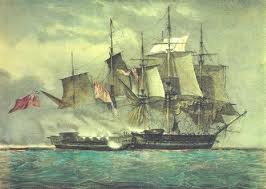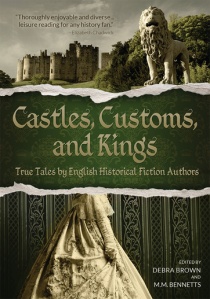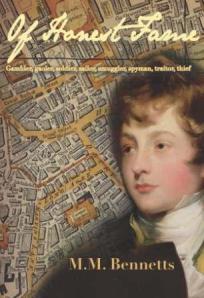This is a bit awkward.
On the one hand, it’s fair to say that I would have done just about anything to have on hand the information that Andrew Lambert brings to light in the aforementioned tome when I was writing my May 1812.
I would have sold…well, maybe not my soul, but quite probably any number of cakes and mousse au chocolat for the happiness of having all of these documents and accounts so clearly and beautifully laid out before me relating to the three-way trade wars between Napoleonic Europe, Great Britain and the young United States.
Instead, I spent months piecing together the history of the various Napoleonic and British acts and the American reactions to them. It was always a case of two lines in this history providing a little information, another small paragraph in another history…
But even if it’s too late for me to include some of the juicier elements in my work, Andrew Lambert has now, at last, most concisely and exhaustively pulled together all the various strands of this messy historic sampler. And it makes for eye-popping reading.
(It doesn’t leave many of the American leaders of the time on their pedestals though. Nor does it paint a very edifying picture of the American press at the time. Napoleon doesn’t come out very different though–though Lambert did make my day when he called him a ‘fraudster’. That was a truly happy moment for self.)
But perhaps the greatest challenge to modern American readers will be that Lambert unequivocally proves that the United States did not win the War of 1812.
They lost. They achieved none of their alleged aims. Neither did they attain any of their genuine goals.
What they did achieve was the destruction of New England’s economy, the bankruptcy of their federal government, the burning of the capital, Washington, mass unemployment, destitution and…and…and…
For those who don’t know, who haven’t heard me rant on the subject, the whole thing got started when Napoleon came up with the cunning plan to wage economic warfare on Great Britain. This he believed would economically cripple Britain so that she could no longer subsidise Continental powers to fight against him, thus allowing him to take the place over. Very clever, eh?
So he issued these decrees known as the Berlin and Milan decrees of 1806 and 1807 which were his attempt to exclude all British goods as well as the British ships that carried those goods from any and all Continental ports and markets.
This was great! It was going to screw British maritime power to the wall. They were going to crumble. Super-dooper, bring me a trooper! (Well, he may have said words to that effect…who knows?)
Yet strangely, the Brits didn’t think having their economy or their naval power ruined by an upstart Mushroom Corsican, as they liked to call him, was such a good idea. Nor did Napoleon have a navy with which to enforce his little programme–he’d lost that (oops) at Trafalgar.
So they retaliated. With the Orders in Council. Which declared that all goods carried to the Continent had to be carried in ships which held a license from Britain, etc. And most importantly, they stepped up their maritime campaign of stopping neutral ships and searching for British seamen who’d decided it was safer to go AWOL than to serve in the Royal Navy. Which, given that this was a time of war, was both desertion and treason.
This then, ostensibly, was what the Americans got hepped up about. And the battle cry rang out, “Free Trade and Sailors’ Rights!” Because it was mostly American ships they were stopping, which had, a hefty contingent of said British sailors…
And this is where Lambert’s work shines so brilliantly.
 For he demonstrates, beyond cavil, that this was really nothing but a political feint. And it was a propaganda war from the get-go. As he writes it, “Americans believed that large numbers of American-born sailors were being impressed. In fact rather less than 10% of the American maritime workforce suffered this fate…A project to surrender all British sailors in American ships in return for the British ending the impressment of Americans was quietly dropped because half of all skilled seamen in American merchant ships were British.”
For he demonstrates, beyond cavil, that this was really nothing but a political feint. And it was a propaganda war from the get-go. As he writes it, “Americans believed that large numbers of American-born sailors were being impressed. In fact rather less than 10% of the American maritime workforce suffered this fate…A project to surrender all British sailors in American ships in return for the British ending the impressment of Americans was quietly dropped because half of all skilled seamen in American merchant ships were British.”
President Jefferson was–he who headed off the American reaction to this economic war–as Lambert illustrates over and over again, fiercely Anglophobic and naively, determinedly Francophile. He was putty in Napoleon’s Froggie hands.
He was also no economist. He produced his response to the situation even before Congress had received notice of the British Orders in Council.
And his cunning plan? The Embargo Act which blocked the American export trade. As Lambert says, “To punish Britain Jefferson made war on American merchants. The results were disastrous: economic hardship obliged American merchants and seafarers to smuggle…Jefferson hoped the Embargo Act would be a useful adjunct to Napoleon’s war against Britain, and that in return a grateful Emperor would give him the prize he really wanted, Spanish Florida.”
But of course, the Emperor wasn’t playing.
Yet as Lambert argues, “Jefferson’s futile Embargo had long antecedents: in 1785 he had argued that America should follow the commercial policy of China ‘to practice neither commerce or navigation’. He…never changed his view that American merchants were corrupt and corruptible. He dreamt of an agricultural America…”
 And James Madison, his successor to the Presidency was just as blinkered.
And James Madison, his successor to the Presidency was just as blinkered.
Though the Federal Government was kept afloat by the taxes and excise they collected from the New England states’ import/export businesses, to the tune of some 98%, in order to pursue their land-grab of Canada while Britain had all her troops otherwise occupied, they played into the hands of Napoleon, wrecked their own trade and economic viability and eventually were cozened into declaring war on Britain.
Lambert also puts on display the extreme bile Madison and his cronies pumped into a press too eager to play the jingoistic tunes of their politicians. The accounts of the various naval actions–accounts which shew that British gunners were out-firing their American counterparts by 3-1–which actions were then twisted into triumphs…in a way, well, it makes for sickening reading.
The lack of honesty or honour, the deceit on display is just…Truthfully, it’s a bit gutting. I’d always thought that Jefferson was this visionary ‘liberty for all’ fellow, you know. Brilliant with a quill. With an eternally great way with words. The most idealistic of the Enlightened thinkers. An ingenious inventor.
Professor Lambert has shown him to be the opposite–to be vindictive, vituperative, economically idiotic, predatory, and base. Denying and lying about Napoleon’s tyrannical reign over Europe, sending gentle good men over to ‘negotiate’ with the monster, who obviously didn’t stick around to be negotiated with…
And the battles. Holy wow!
Of course, they’re written with all the verve and derring-do of a Patrick O’Brian clash at sea.
But these were real men, and the actions pitted the professional seamen of the Royal Navy–men who drilled and drilled and worked hard at being the best in all weathers–against blaggarts and braggadocios, some brave, but too many who initiated actions against ships much, much smaller than themselves and then who crowed victory and lied about the disparity in size.
 And when they really were outgunned and outmanoeuvred and outfought, such as when the HMS Shannon took the USS Chesapeake in one of the bloodiest actions of any naval war on 1 June 1813–in 13 minutes, the American press invented scapegoats and declared it a victory anyway.
And when they really were outgunned and outmanoeuvred and outfought, such as when the HMS Shannon took the USS Chesapeake in one of the bloodiest actions of any naval war on 1 June 1813–in 13 minutes, the American press invented scapegoats and declared it a victory anyway.
The whole unfoldment of action which led to the burning of the capital makes for pretty gob-smacking reading too. There’s always been this prim, self-righteous shock and horror professed over those meanie Brits who came and burned (can you imagine anything so demonic, so savage?) the charming, innocent, delightful little American capital.
(Forgive me if I’m sounding sarky here.)
But hang on a minute, one wants to say to Madison and his mates. This was war. You declared it on Britain. Did you think it’d be a picnic? A riparian entertainment with sparklers?
Did you miss the part about there being a world war on? Did Jefferson, in his Francophile gushing, not notice that one of the methods of military engagement was the occupation [and destruction] of the enemy’s capital? Such as Napoleon did to Berlin. And Vienna. And Madrid. And Moscow. Or did he fail to read those parts of the news bulletins?
And what happened really?
It had needed only 4000 troops to capture the American capital and torch the various public buildings, including the White House and the Navy Yard, as Lambert says, “revealing the unimaginable folly of a government that deliberately picked a fight with a global power, allegedly about questions of principle, without bothering to raise an army or navy capable of defending the country. By 1814 the only effective American armies were attempting to conquer Canada.”
The war whimpered to a close in 1814 with the American negotiators quietly dropping all the demands for which they’d allegedly gone to war. They just wanted out. They couldn’t afford any more of it. And Napoleon hadn’t won in Russia as they’d hoped he would. In fact, he’d lost all of his Empire and been forced to abdicate. (Ouch.)
So, they stopped whinging about British deserters being removed from American ships, etc. They stopped sending troops up to take Canada–they changed their song from we’ll get Canada and land, land, land, to isn’t it great we haven’t lost any territory…that kind of thing.
At this point, I’m probably just babbling.
What can I tell you? Lambert has simply blown me out of the water with his searing account of this disastrous American war which they’ve somehow blagged into an iconic victory over a 19th century superpower.
And there are so many reasons for recommending this book that I can only gawp at the sheer number of them. So all I can honestly say is: Buy it. Read it. Wonder at it. Andrew Lambert’s The Challenge. It really is that good.
 It hits the shelves on the 23rd September 2013, this tome does, courtesy of Madison Street Publishing.
It hits the shelves on the 23rd September 2013, this tome does, courtesy of Madison Street Publishing. “This book is a scholarly treasure trove with a wide appeal. It covers everything from the first English word to the food (and recipes) served at a Tudor feast. If you are interested in nonfiction works on England, history, and/or royalty you will find a book that you will return to. Fans of historical fiction and England will find the book rich in supplemental information to complement their reading with an introduction to authors of works they might enjoy.”
“This book is a scholarly treasure trove with a wide appeal. It covers everything from the first English word to the food (and recipes) served at a Tudor feast. If you are interested in nonfiction works on England, history, and/or royalty you will find a book that you will return to. Fans of historical fiction and England will find the book rich in supplemental information to complement their reading with an introduction to authors of works they might enjoy.”





















